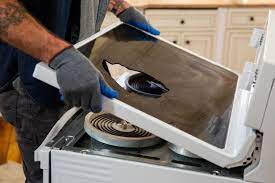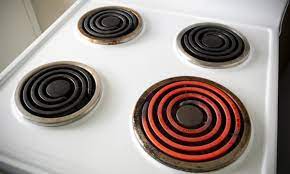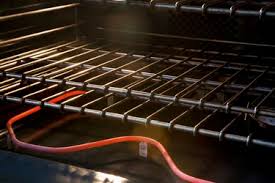Stove Repairs
FAQ
1. What are common stove and oven problems and solutions?
Common problems include issues with electric stoves not heating, heat not adjusting, gas stoves not lighting, oven doors not shutting, self-cleaning not working, incorrect oven temperature, faulty igniters, and strange noises. Addressing these problems promptly is crucial.
2. Why isn't my electric stove heating?
This can be due to a faulty heating element, a damaged temperature regulator, or issues with the power supply. Check the power supply connection first. The heating element or temperature regulator likely needs professional replacement if that doesn't fix it.
3. Why won't the heat adjust on my stove?
On an electric stove, the issue could be with the infinite switch or element control knob, which may need replacing. For gas stoves, a faulty gas valve is often the cause and requires professional replacement.
4. Why won't my gas stove light?
This is a common problem caused by issues with the igniter or burner assembly. Cleaning these components might fix the issue, but replacement may be necessary if they are damaged or worn out. It is best to call a professional for this type of repair.
5. Why won't my oven door shut properly?
This issue is commonly caused by worn-out hinges or seals. These parts can easily be replaced with new ones. Ensure you get the correct replacement parts for your specific stove or oven model.
6. Why isn't my oven's self-cleaning function working?
Possible causes include a malfunctioning door latch, a faulty thermostat, or a blown thermal fuse. Ensure the oven door is securely locked, as the cycle won't start otherwise. Check the thermostat and thermal fuse for damage. Consult your oven's manual for troubleshooting steps specific to your model.
7. Why is my oven temperature incorrect?
This issue often stems from a miscalibrated thermostat, a faulty temperature regulator, or a malfunctioning heating element. You can use an oven thermometer to compare the actual temperature inside your oven with the setting on the dial. If there's a discrepancy, consult your oven's manual for calibration instructions, which may involve making minor adjustments. If recalibration doesn't work, the temperature regulator and heating element should be inspected and may need replacement if defective.
8. How do I calibrate my oven temperature?
Calibration procedures vary slightly depending on whether your oven has analogue or digital controls.
* Analogue Controls: Place an oven thermometer on the centre rack, preheat to 200°C, check the thermometer reading (if it's 10°C off, it needs calibration). Remove the temperature knob, turn it over, and adjust one or two screws (counterclockwise if running cold, clockwise if hot). Turn them gradually (about an eighth of a turn at a time) and retest.
* Digital Controls: Place an oven thermometer on the centre rack, preheat to 200°C, and check the thermometer reading (if 10°C off, it needs calibration). Check your owner's manual for instructions on how to adjust the temperature, typically using arrows or menu prompts, and then save the setting.
9. How do I know if my oven needs calibration?
Your oven may need calibration if your food is coming out under or overcooked. To test, preheat the oven to 200°C with an oven thermometer centred on the middle rack. If the thermometer reads 10°C higher or lower than 200°F when the oven indicates it's reached the set temperature, it may need calibration.
10. Can all ovens be calibrated?
All ovens can be calibrated. Electric ovens with analogue or digital controls and gas ovens with digital controls can typically be calibrated using the described steps. However, gas ovens with analogue controls may require more expertise, and you should contact a certified technician.
11. Why is my oven making strange noises?
Strange noises like squeaks or rattles could be due to worn-out or damaged parts. These parts can easily be replaced by a professional to ensure safe and quiet operation.
12. What is a faulty igniter in a gas oven, and how is it addressed?
A faulty igniter is a common issue in gas ovens that prevents proper heating. Its main job is to ignite the gas and open the oven safety valve. Signs include the oven not heating up or taking too long to preheat. Listen for a clicking sound; if there's none, the igniter may need replacement. You can visually inspect it for cracks or damage. Replacing it involves accessing the igniter, disconnecting wiring, and installing a new one, but dealing with gas appliances can be hazardous, so professional repair is often safer and more efficient.
13. What maintenance should I perform on my stove and oven?
Regular maintenance is essential to prevent common problems. This includes cleaning the burners and oven regularly, checking for any visible wear and tear, and scheduling professional inspections and tune-ups.
14. What are reliable/least stressful brands for kitchen appliances, specifically stoves, ovens, and cooktops?
Opinions vary widely among users and professionals in the sources.
* On the New Zealand market, the most common stove and oven brands are Fisher & Paykel, Simpson and Westinghouse.
* Some recommend *GE** or Frigidaire. GE Cafe and Profile are often mentioned positively for ranges/ovens, though some note issues like scratched glass tops or control problems. GE is considered decent for cooking appliances
* Bosch is frequently recommended for dishwashers, and some suggest them for cooktops/ranges. However, some sources note Bosch's reliability has diminished over the past 5 years.
* KitchenAid is mentioned for ranges and dishwashers, though experiences are mixed, with some noting issues like slow preheating or general unreliability.
* Whirlpool and Maytag are part of the same group and were previously recommended for sales, but control board issues have been observed since 2017. Some recent users have positive experiences with Whirlpool. Maytag is suggested for overall appliance suites (excluding side-by-side refrigerators).
* Samsung receives conflicting reviews. Some users have had issues with their ranges, while others find them fine. Some sources strongly advise against Samsung, particularly for appliances with water, but note that Samsung makes "great stoves" despite issues with other products like refrigerators. The volume of Samsung sales might also contribute to the number of reported issues.
* LG stoves have surprisingly high Consumer Reports ratings according to one source. However, other sources broadly advise staying away from LG kitchen appliances.
* High-end brands like *Miele** (induction cooktops), Thermador (ranges/ovens), Wolf (ranges/ovens), Viking (ranges/ovens), and Bluestar (ranges) are mentioned for quality and performance, but come at a higher price point and may have service challenges.
* Ultimately, there is no single consensus; experiences vary, and focusing on simpler models with fewer features is often recommended for reliability regardless of brand.
15. Are Consumer Reports' reliability ratings trustworthy for appliances like stoves, ovens, and hobs?
Sources present conflicting views. Some recommend using Consumer Reports for data and ratings. Others express distrust, claiming recommendations can be paid for and the website is essentially an advertisement. One source points out that CR's recommended brands can change significantly year to year and suggests looking at service rates as a percentage of sales as a better indicator of reliability.
16. Should I buy appliances with lots of features?
Sources generally suggest that the more options or features an appliance has, the more things there are to break. Keeping it simple is recommended for better reliability.
17. Are newer kitchen appliances built to last as long as older ones?
The consensus among many sources is no. Older appliances were often made better. Appliances today are perceived as being built to fail sooner due to companies prioritising profit over longevity. All brands are considered stressful, and this may be exacerbated since the pandemic due to changes in parts suppliers. Simple, older designs are noted as being easy and cheap to repair.
18. Where can I find help troubleshooting or repairing my cooktop or oven myself?
Websites like iFixit provide repair guides, manuals, and troubleshooting help specifically for Cooktops. Manufacturers like Maytag offer options for Troubleshoot and Self Repair, along with access to Product Manuals and Product Help. LG also provides a Help Library, Video Tutorials, and Manuals for support.
19. Where can I find replacement parts for cooktop or oven repair?
Websites like iFixit list parts for specific appliance types, such as Cooktops. Manufacturers often list Parts & Accessories as an additional support option. For example, Maytag mentions Kitchen Parts & Accessories for Ranges and Microwaves.
20. What are some specific problems with common cooktop/oven features or designs?
Sources mention that glass top ranges can be easy to scratch, and their touchscreens can be a pain to clean. There is also a noted design issue with front knobs on some slide-in ranges (including Samsung) that can activate by just grazing them.


Ceramic top repairs
Deals
Daily specials, coupons on home appliances available.
Service
Repair
022-042-0665
© 2025. All rights reserved.




